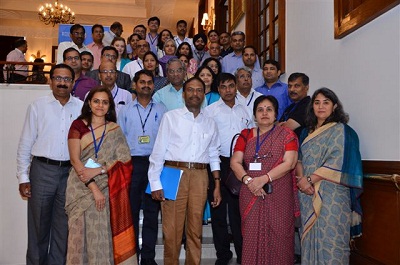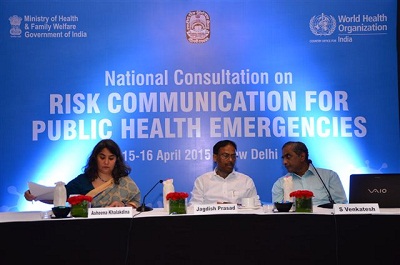
The WHO Country Office for India in collaboration with National Centre for Disease Control (NCDC), Directorate of Health Services, Ministry of Health & Family Welfare organized a two-day national consultation on risk communication for public health emergencies on 15-16 April 2015 in New Delhi.
The International Health Regulations, IHR (2005) recognizes risk communication as a critical pillar for developing national core capacity during emerging infectious diseases and other IHR (2005) related events. Done well, risk communication can help ‘populations at risk’ make informed decisions, encourage protective behaviours and complement existing surveillance systems.
The consultation was aimed at enhancing capacity of IHR (2005) stakeholders for understanding the nuances of risk communication, provide a forum for sharing experiences and challenges and also as a first step to advance the agenda of an all hazard plan development for IHR threats.
The main objectives of the meeting were:
- To enhance understanding on principles and concepts of risk communication.
- To share experiences and challenges in risk communication during recent public health events in India
- To provide orientation on developing risk communication plan for IHR(2005) threats and role of concerned stakeholders.
- To discuss the way forward for the national risk communication plan for public health emergencies, with an all hazard approach

The inaugural session was addressed by Prof (Dr.) Jagdish Prasad, Director-General Health Services, MoHFW, Government of India; Dr Venkatesh, Director, National Centre for Disease Control, MoHFW and Dr Asheena Khalakdina, Team Lead, Communicable Diseases, WHO Country Office for India. Also present at the consultation were representatives from ministries of health, agriculture and defence; state health departments; points of entry personnel; National Disaster Management Association (NDMA); other sector departments covering environmental health, food safety, chemical safety; research institutions; academia; spokespersons from tertiary care institutes, other health programmes ( Vectorborne diseases, HIV/AIDS), Public Health Foundation of India and partner agencies – UNICEF and Centers for Disease Control.
Effective communication regarding threats posed by public health emergencies and the actions needed during them remains a significant challenge. Experiences from the influenza pandemic A/H1N1 (2009), Ebola screening of travelers returning from West Africa, recent outbreak of influenza A/H1N1 were shared by participants that highlighted the need for risk communication to be better understood and more systematically managed. In addition, WHO communication experts also shared experiences on challenges in community engagement from Ebola outbreak in West Africa. Announcing the outbreak early, transparency and media engagement were other topics discussed, besides next steps towards developing an all hazard risk communication plan for India.
